Related Research Articles

Musical theatre is a form of theatrical performance that combines songs, spoken dialogue, acting and dance. The story and emotional content of a musical – humor, pathos, love, anger – are communicated through words, music, movement and technical aspects of the entertainment as an integrated whole. Although musical theatre overlaps with other theatrical forms like opera and dance, it may be distinguished by the equal importance given to the music as compared with the dialogue, movement and other elements. Since the early 20th century, musical theatre stage works have generally been called, simply, musicals.

Andrew Lloyd Webber, Baron Lloyd-Webber, is an English composer and impresario of musical theatre. Several of his musicals have run for more than a decade both in the West End and on Broadway. He has composed 21 musicals, a song cycle, a set of variations, two film scores, and a Latin Requiem Mass.

Lionel Bart was a British writer and composer of pop music and musicals. He wrote Tommy Steele's "Rock with the Caveman" and was the sole creator of the musical Oliver! (1960). With Oliver! and his work alongside theatre director Joan Littlewood at Theatre Royal, Stratford East, he played an instrumental role in the 1960s birth of the British musical theatre scene after an era when American musicals had dominated the West End.

John Harold Kander is an American composer, known largely for his work in the musical theater. As part of the songwriting team Kander and Ebb, Kander wrote the scores for 15 musicals, including Cabaret (1966) and Chicago (1975), both of which were later adapted into acclaimed films. He and Ebb also wrote the standard "New York, New York".

Fred Ebb was an American musical theatre lyricist who had many successful collaborations with composer John Kander. The Kander and Ebb team frequently wrote for such performers as Liza Minnelli and Chita Rivera.

Rodgers and Hammerstein was a theater-writing team of composer Richard Rodgers (1902–1979) and lyricist-dramatist Oscar Hammerstein II (1895–1960), who together created a series of innovative and influential American musicals. Their popular Broadway productions in the 1940s and 1950s initiated what is considered the "golden age" of musical theater. Five of their Broadway shows, Oklahoma!, Carousel, South Pacific, The King and I and The Sound of Music, were outstanding successes, as was the television broadcast of Cinderella (1957). Of the other four shows that the team produced on Broadway during their lifetimes, Flower Drum Song was well-received, and none was an outright flop. Most of their shows have received frequent revivals around the world, both professional and amateur. Among the many accolades their shows garnered were 34 Tony Awards, fifteen Academy Awards, two Pulitzer Prizes and two Grammy Awards.

Song and Dance is a musical comprising two acts, one told entirely in "Song" and one entirely in "Dance", tied together by a unifying love story.
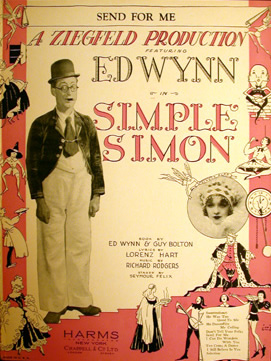
Simple Simon is a Broadway musical with book by Guy Bolton, and Ed Wynn, lyrics by Lorenz Hart, music by Richard Rodgers, produced by Florenz Ziegfeld Jr., and starring Ed Wynn.
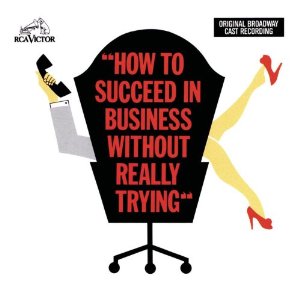
How to Succeed in Business Without Really Trying is a 1961 musical by Frank Loesser and book by Abe Burrows, Jack Weinstock, and Willie Gilbert, based on Shepherd Mead's 1952 book of the same name. The story concerns young, ambitious J. Pierrepont Finch, who, with the help of the book How to Succeed in Business Without Really Trying, rises from window washer to chairman of the board of the World Wide Wicket Company.
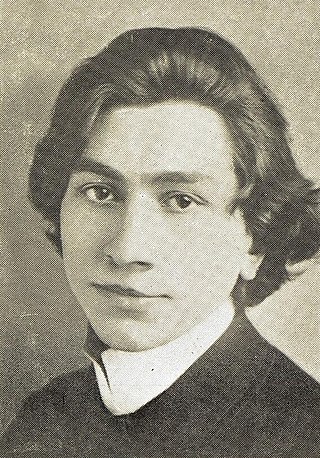
Charles Rudolf Friml was a Czech-born composer of operettas, musicals, songs and piano pieces, as well as a pianist. After musical training and a brief performing career in his native Prague, Friml moved to the United States, where he became a composer. His best-known works are Rose-Marie and The Vagabond King, each of which enjoyed success on Broadway and in London and were adapted for film.
Martin Charnin was an American lyricist, writer, and theatre director. Charnin's best-known work is as conceiver, director, and lyricist of the musical Annie.
David Joel Zippel is an American musical theatre lyricist, director, and producer.
Paris is a musical with the book by Martin Brown, and music and lyrics by Cole Porter, as well as Walter Kollo and Louis Alter (music) and E. Ray Goetz and Roy Turk (lyrics). The musical, which premiered on Broadway in 1928, was Porter's first Broadway hit. The musical introduced the song "Let's Do It, Let's Fall in Love" sung by the show's star, Irene Bordoni. The story involves a young man from a very proper family in Newton, Massachusetts whose mother is horrified by his intention to wed a French actress.
Henry Martyn Blossom, Jr. was an American writer, playwright, novelist, opera librettist, and lyricist. He first gained wide attention for his second novel, Checkers: A Hard Luck Story (1896), which was successfully adapted by Blossom into a 1903 Broadway play, Checkers. It was Blossom's first stage work and his first critical success in the theatre. The play in turn was adapted by others creatives into two silent films, one in 1913 and the other in 1919, and the play was the basis for the 1920 Broadway musical Honey Girl. Checkers was soon followed by Blossom's first critical success as a lyricist, the comic opera The Yankee Consul (1903), on which he collaborated with fellow Saint Louis resident and composer Alfred G. Robyn. This work was also adapted into a silent film in 1921. He later collaborated with Robyn again; writing the book and lyrics for their 1912 musical All for the Ladies.
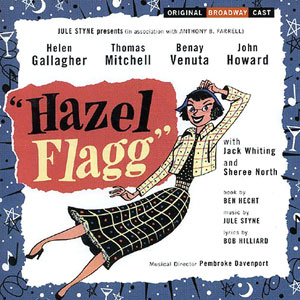
Hazel Flagg is a 1953 musical, book by Ben Hecht, based on a story by James H. Street. The lyrics are by Bob Hilliard, and music by Jule Styne. The musical is based on the 1937 screwball comedy film Nothing Sacred, the primary screenwriter of which was Ben Hecht.
Nick & Nora is a musical with a book by Arthur Laurents, lyrics by Richard Maltby, Jr., and music by Charles Strouse.
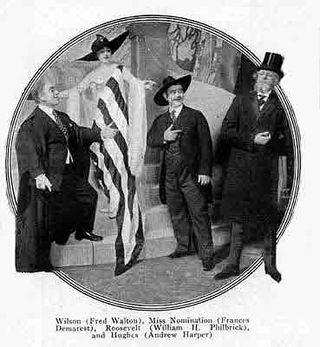
The Passing Show of 1916 is a revue featuring the music of Sigmund Romberg and Otto Motzan, with book and lyrics by Harold Atteridge. It included the first George Gershwin songs introduced in a Broadway show.
Glen Berger is an American playwright and scriptwriter. He has received commissions from the Children’s Theater of Minneapolis, Berkeley Repertory Theatre, the Alley Theatre, and the Lookingglass Theater.

Oh, My Dear! was a Broadway musical comedy in two acts with book and lyrics by Guy Bolton and P. G. Wodehouse, and music by Louis A. Hirsch. The play was produced by William Elliott and F. Ray Comstock and opened under the direction of Robert Milton and Edward Royce at the Princess Theatre on West 39th Street in New York City on November 27, 1918. Oh, My Dear! had a run of 189 performances, with the final curtain falling on May 10, 1919. The musical takes place at Dr. Rockett's Health Farm in the state of New York.

Daly's Theatre was a Broadway theatre at 1221 Broadway and 30th Street. It was built in 1867 and opened that year as Banvard's Museum but changed its name the following year to Wood's Museum and Metropolitan. In 1876 it became the Broadway Theatre, and finally was named Daly's Theatre in 1879 when it was acquired by Augustin Daly. After 1899, it was operated by the Shubert family. The building was demolished in 1920, after serving as a burlesque theatre and cinema.
References
- ↑ Bordman, Gerald Martin. American Musical Theatre: A Chronicle, Oxford University Press (2010), p. 385 ISBN 0199729700
- ↑ Dan Dietz (2021). "Sometime". The Complete Book of 1910s Broadway Musicals. Rowman & Littlefield Publishers. pp. 448–449. ISBN 9781538150283.
- ↑ Sometime at the Internet Broadway Database